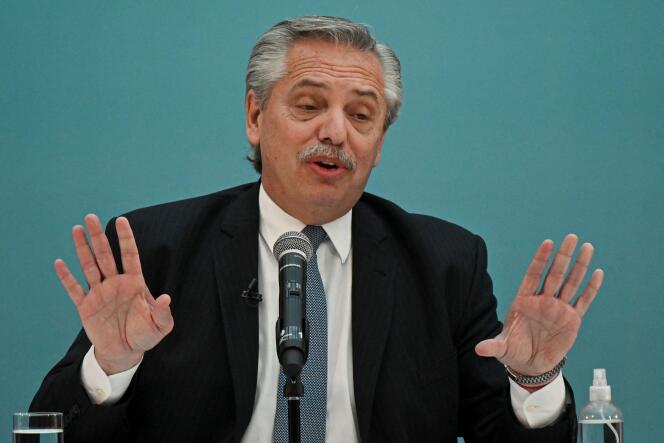
Image source: Le Monde
By Lautaro Clavero, Student at the Universidad Nacional de Córdoba.
Argentina’s current president Alberto Fernández briefly met with the United States president Joe Biden at the end of March. He was seeking help, once again to renegotiate the significant amount of debt contracted with the IMF during 2018.
Although the IMF has helped Argentina several times during the past years, the debt negotiated in 2018 is of special relevance. It amounts to 45 billion US dollars, and it comes from an original arrangement for 57 billion of US dollars. Economists agreed this is the biggest loan in the IMF history. As expected, the agreement jointly came with a series of economic policy compromises aimed at achieving a fiscal deficit of 2.4% and 1.9% of GPD in 2022 and 2023 respectively.
However, Argentina always seems to find an excuse to avoid its commitments. In this case the pretext is the lack of foreign reserves caused by the drought that seriously affected the agricultural sector, which traditionally generates the inflow of US dollars, mainly soybean exports. As Sergio Massa (A lawyer acting as chairperson of the Ministry of Economics) said “We are facing one of the most serious droughts in Argentinian history, this affected the harvest, causing hundreds of thousands of animals to die and thousands of jobs lost.” La Nacion, 27 March 2023. Under these circumstances, the government states that it is impossible to pay the 20 billion dollars agreed for this year. Certainly, a question certainly arises in this scenario: What has the public administration been doing to solve the liquidity problem the country faces? As expected, not much.
Two of the measurements adopted by the president and his economic advisors have actually implied no effort at all. These measures tend to follow the line of a policy kindly known by the people as “vamos viendo” (wait and see). This simply means that the government passively acts as the times goes by but clearly hasn’t any economic plan.
The first measure was to quietly expect a reduction in its real expenditure. The underlying mechanism involved a lower growth rate in nominal public sector salaries and retirement pensions than the inflation rate. As a consequence, during 2022 public salaries increased by 97% and retirement pensions by 72,5% whereas inflation amounted to 96%. Nonetheless, the public salaries were adjusted after a lag and they consequently lost purchasing capacity. As to the second measure, during 2022 federal taxes augmented and made public income grow by 5%. As seen, both measures perfectly fit the “vamos viendo” policy adopted by the government.

Public sector real salary index 2013-2022.
Source: IARAF
In the “vamos viendo” policy inflation is comfortable for the government. It has two roles and both explain why the current administration refuses to renounce it. On the one hand, as previously said, such a high inflation rate provides a deceitful way of lowering real government spending. This can help to partially achieve some of the compromises adopted with the IMF. On the other hand, inflation helps to finance the fiscal deficit and the central bank is fully aware of this: It notably expanded the monetary base by 87% or 3.4 trillion of pesos, during 2022.

Monetary base evolution (millions of pesos) since 2019.
Source: BCRA.org
The motionlessness of the government in terms of economic policy clearly contrasts with its harmful creativity. It’s worth mentioning that its imagination made the economic situation worse, according to growth, inflation and poverty indicators. Data shows that Argentinian economy hasn’t grown since 2011, and the poverty index has escalated up to 39,2%, its maximum since 2006. The design of quite diverse exchange rates for the different sectors of the economy goes in this direction. This invention was to prevent a necessary exchange rate adjustment, which will probably occur due to recurrent balance-of-payment problems and to stop economic collapse.

Accumulated inflation evolution since June 2022.
Source: indec.gov.ar
Regardless of how successful the new arrangement between Argentina and the IMF concludes, it is mandatory for the government to adopt a new series of policies that enables a solid and relievable economic growth, avoids crisis, high inflation rate and reduces poverty originated by the constant fiscal and monetary indiscipline. This implies the elimination of the “vamos viendo” policy and the adoption of the “tenemos un plan” (we clearly have a plan) one.

Lautaro Clavero
Lautaro is a non-official ambassador of the Patagonia region where he was born. He is pursuing a bachelor’s degree in economics atUniversidad Nacional de Córdoba. During 2021, he conducted his radio program “La economía en una lección” (The economy in one lesson), while, at the same time he started to write as a journalist. His main interest includes Macroeconomics and statistics, being a teaching assistant for those same subjects at his university.